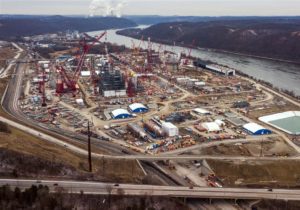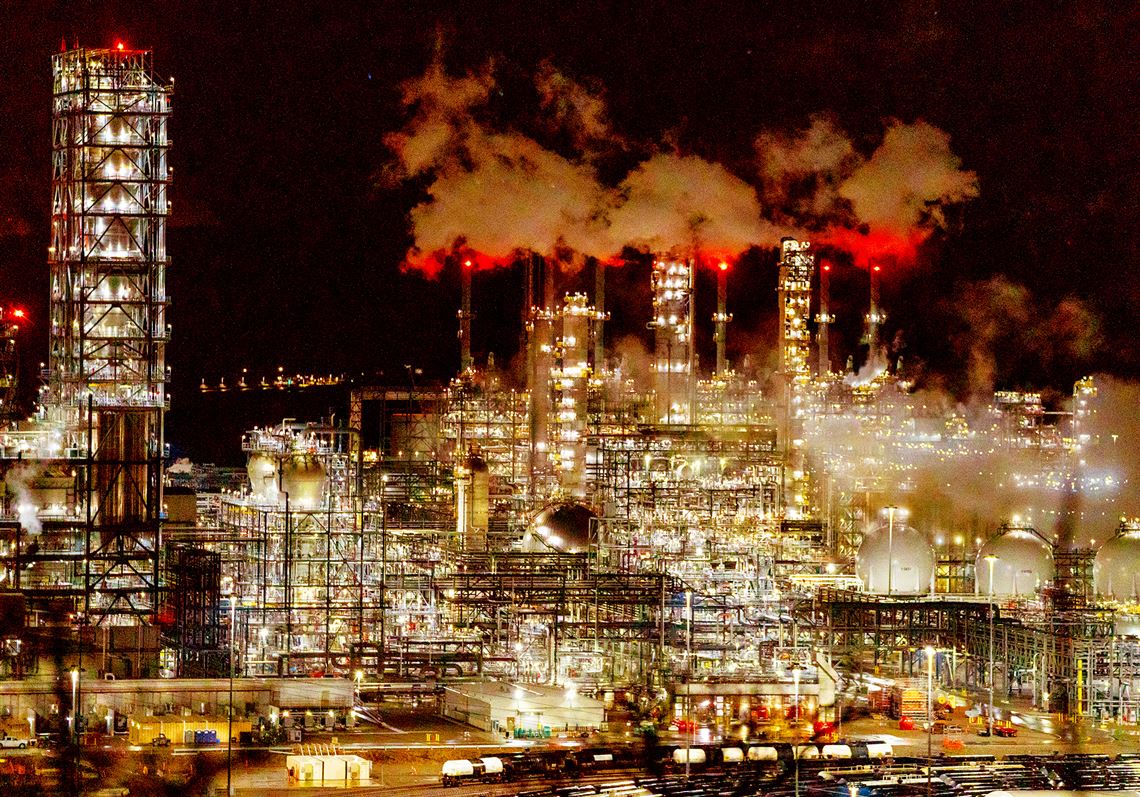
MONACA, PA (March 21, 2024) — Shell’s Beaver County plastics plant will no longer be able to operate under a construction permit. The Clean Air Act and Environmental Protection Agency (EPA) regulations require that a facility submit a Title V Operating Permit application within 12 months of commencing operation.
Despite starting operations in November 2022, the plant was still renewing its construction permit with Pennsylvania Department of Environmental Protection (PADEP). PADEP issued a letter on February 22, 2024, directing Shell Chemical Appalachia to submit a Title V Operating Permit application within 120 days. Once that application is submitted, PADEP must issue or deny the permit within 18 months.
“Since its opening in late 2022, Shell’s Beaver County plastics plant has been a serial lawbreaker, illegally emitting many tons of pollution into the air we breathe,” said Alex Bomstein, Clean Air Council Executive Director. “PADEP’s order to Shell to apply for a Title V Operating Permit for its plant sets up the public and our environment with better protection from harmful pollution, and allows the public to file comments and petition the EPA to object to any potential shortcomings in the resulting permit.”
Shell exceeded its 12-month rolling emission limits for volatile organic compounds (VOC) beginning in October 2022 through April 2023, carbon monoxide (CO) from February through March 2023, nitrogen oxides (NOx) from December 2022 through April 2023, and hazardous air pollutants (HAP) from December 2022 through April 2023. In addition to emissions violations, PADEP cited Shell for flaring violations from June 2022 through April 2023, and malodor violations from its wastewater treatment plant in January, February, and April 2023 – which included discharging benzene into the Ohio River.
Beaver County Marcellus Awareness Community (BCMAC) sent a letter to PADEP today requesting that once they receive Shell’s application it will be posted on their website so that the community has ample time for view. BCMAC will also ask that a public hearing be held to allow sufficient time for public comment.
“We’re working with local, regional and national partners who have the legal and technical experience with Title V permits to ensure that Beaver County residents will be accurately informed every step of the way,” said Hilary O’Toole, Executive Director of BCMAC. She continued, “We will be scheduling meetings and educational events throughout Beaver County to engage municipal leaders and community members.”
The PADEP must receive Shell’s Title V application by June 21, 2024.

Environmental Integrity Project and Clean Air Council Sue Shell Polymers Monaca Plant Near Pittsburgh to Halt Illegal Emissions of Smog-Forming Pollutants
Pittsburgh — The Environmental Integrity Project and Clean Air Council filed a federal lawsuit against Shell today for repeatedly violating permitted air pollution limits from a massive new plastics production plant northwest of Pittsburgh, which opened last year.
In a lawsuit filed in the U.S. District Court for the Western District of Pennsylvania, the environmental groups called for strict penalties and a halt to the illegal release of smog-forming pollutants from the Shell Polymers Monaca plant in Beaver County, on the banks of the Ohio River.
“Shell received $1.6 billion in taxpayer subsidies from the state to build this plant. The very least this international corporation can do is to follow the law and not make Pennsylvania taxpayers breathe in their illegal pollution,” said Sarah Kula, attorney for the Environmental Integrity Project.
Joseph Minott, Executive Director of the Clean Air Council, said: “Shell’s persistent law-breaking must end. The community will not tolerate dangerous pollution events that risk the health of families across Beaver County and beyond.”
The roughly $6 billion Shell Monaca plant transforms a product of natural gas (ethane), extracted through hydraulic fracturing in the region’s shale formations, into tiny plastic pellets used to manufacture single-use plastic goods like soda bottles and plastic packaging.
The plant has repeatedly violated limits that must be met on a 12-month rolling basis for nitrogen oxide (NOx) and volatile organic compound (VOC) air pollution, which contribute to smog, asthma attacks, and lung disease, according to state records and the lawsuit. The VOCs include benzene, a known carcinogen.
The facility has also shaken the surrounding community by releasing clouds of black smoke from its flares during malfunctions and odors that have caused residents to feel sick.
Pennsylvania Department of Environmental Protection (DEP) records show 12 state notices of air pollution violations at the Shell plant since January of 2022, but no enforcement actions or penalties by the state.
State records also show that Shell submitted 39 reports of malfunctions at the plant during the same time period, including flaring on February 13 that released large plumes of black smoke and flames for hours during an “upset” incident in the ethylene cracking unit.
The most recent problems at the Shell plant include an accident on April 11, when a malfunction at its wastewater treatment plant released high levels of benzene, as measured by fenceline air monitors. The air monitors measured benzene as high as 185 micrograms per cubic meter – which is more than six times higher than federal guidelines for short-term exposure to this pollutant.
Local residents reported strong odors, headaches, watery eyes, irritated throats, and nausea during the benzene release incident.
Because of all the violations and ongoing problems at the plant, the Clean Air Council and Environmental Integrity Project sent a letter to DEP on February 17 urging the state to temporarily halt operations at the Shell plastics plant to protect the health of nearby residents.
The same day, the groups sent Shell a notice of intent to sue for violating, within a few months, the chemical plant’s 12-month permit limit on nitrogen oxides. Previously, the groups sent Shell another notice on February 2 because of other violations of the plant’s air permit, including a violation of prohibition on certain “visible emissions,” including black smoke from flares.
Under the federal Clean Air Act, plaintiffs must send notices of intent to sue at least 60 days before filing a complaint in federal court.
“The repeated and ongoing … violations at the plant harm the health and disrupt the lives of the (Clean Air Council’s) members and other individuals who live, go to school, recreate, and work near the plant,” the lawsuit filed today states.
For a copy of the lawsuit, click here.

Pittsburgh, PA — A pair of environmental organizations today sent a letter to Pennsylvania urging the state to temporarily halt operations at a Shell plastics chemical plant northwest of Pittsburgh that has repeatedly violated air pollution limits and recently released plumes of black smoke for several hours.
Clean Air Council and the Environmental Integrity Project asked the Pennsylvania Department of Environmental Protection to temporarily halt operations of the Shell Polymers Monaca plant in Beaver County until the company can demonstrate it can operate in compliance with pollution control laws.
The two groups also today filed a notice of intent to sue Shell for violating the chemical plant’s 12-month permit limit on nitrogen oxides (NOx), which contribute to asthma attacks, lung disease, and (in the environment) smog and acid rain. This is the second notice from the groups in three weeks: On February 2, the organizations sent a notice to Shell for other violations of the plant’s air permit, including a 12-month limit on volatile organic compounds (VOCs), which also contribute to smog and health problems, and a prohibition on certain “visible emissions,” including black smoke from flares.
Under the federal Clean Air Act, plaintiffs must send notices of intent to sue at least 60 days before filing a complaint in federal court.
“DEP must act quickly to stop Shell’s ongoing violations of pollution limits that are meant to protect public health” said Sarah Kula, attorney for the Environmental Integrity Project. “Since the plant has come online, Shell has struggled to meet its permit limits, and DEP needs to order a pause to operations until Shell can comply with the law.”
“We will continue to hold Shell accountable as long as they continue to violate the law,” said Joseph Minott, Clean Air Council Executive Director and Chief Counsel. “The health and environmental risks that come with pollution exceedances can harm communities and the region for generations to come. DEP must put the plant on hold until Shell can get its act together.”
On Monday, the Shell plant’s flare released large amounts of black smoke over the course of several hours. BreatheCam.org footage of the February 13th event can be found here. Plants often use these flaring events to burn off chemicals rather than vent directly into the atmosphere, but Shell’s permit does not allow the kind of visible emissions that occurred on Monday. When a flare is not operating properly, it can release dangerous air pollution, including fine particulate matter, benzene, hexane, formaldehyde, mercury, arsenic, and other organic hazardous air pollutants.
In 2022, Shell emitted 346 tons of NOx, which exceeded its permitted annual NOx emissions (328.8 tons of NOx in a 12-month period). From August to December 2022 alone, the plant emitted 310 tons of NOx – nearly reaching the 12-month limit during this five month period.
For a copy of the letter to the Pennsylvania Department of Environmental Protection, click here. For the most recent notice of intent to sue with exhibits, click here.

Pittsburgh, Pa. – Today, the Environmental Integrity Project and Clean Air Council filed a notice of intent to sue a petrochemical plant in Beaver County, about 30 miles west of Pittsburgh, for repeated violations of air pollution limits.
The action against Shell Chemical Appalachia’s plant, located in Potter Township, is for illegal emissions of volatile organic compounds (or VOCs), which contribute to smog and can cause nausea, nerve damage, and other health problems, as well as nitrogen oxides, which can trigger asthma attacks and respiratory illness.
Under the federal Clean Air Act, plaintiffs must send notices of intent to sue at least 60 days before filing a complaint in federal court.
“Shell has blown through permit limits in the first few months of operation, putting nearby communities in harm’s way,” said Sarah Kula, Attorney for the Environmental Integrity Project. “Shell must be held accountable under the law and take appropriate steps to prevent illegal pollution going forward.”
“Shell’s exceedances are not just numbers in a book, they are tons of pollution that can harm and even kill people,” said Joseph Minott, Clean Air Council Executive Director and Chief Counsel. “We can’t allow these pollution events to become the cost of doing business. There must be strict penalties to deter this clear violation of the laws.”
In September 2022, the plant, called Shell Polymers Monaca, emitted 512 tons of VOCs, nearly reaching the 12-month permitted limit of its approved VOC emissions (516.2 tons of VOCs in any consecutive 12-month period) over the course of a single month, and all but guaranteeing ongoing VOC permit violations deep into 2023.
Shell also emitted nitrogen oxide (NOx) and carbon monoxide (CO) from sources at the plant in the final months of 2022 at rates that exceed permit limits, according to the notice of intent to sue.
In addition, public records show that Shell released soot and other “visible emissions” that violate limits in its permit and the Clean Air Act. The law prohibits visible emissions from flares and incinerators at Shell’s plant that exceed 0% opacity, including plumes of black smoke, for more than five minutes during any consecutive two-hour period.
For a copy of the notice of intent to sue, click here. To view the accompanying exhibits, click here.

